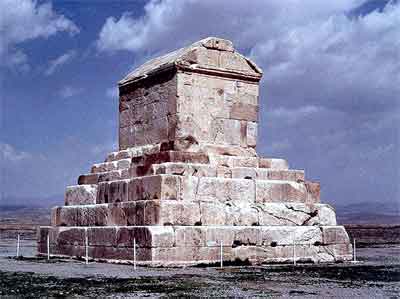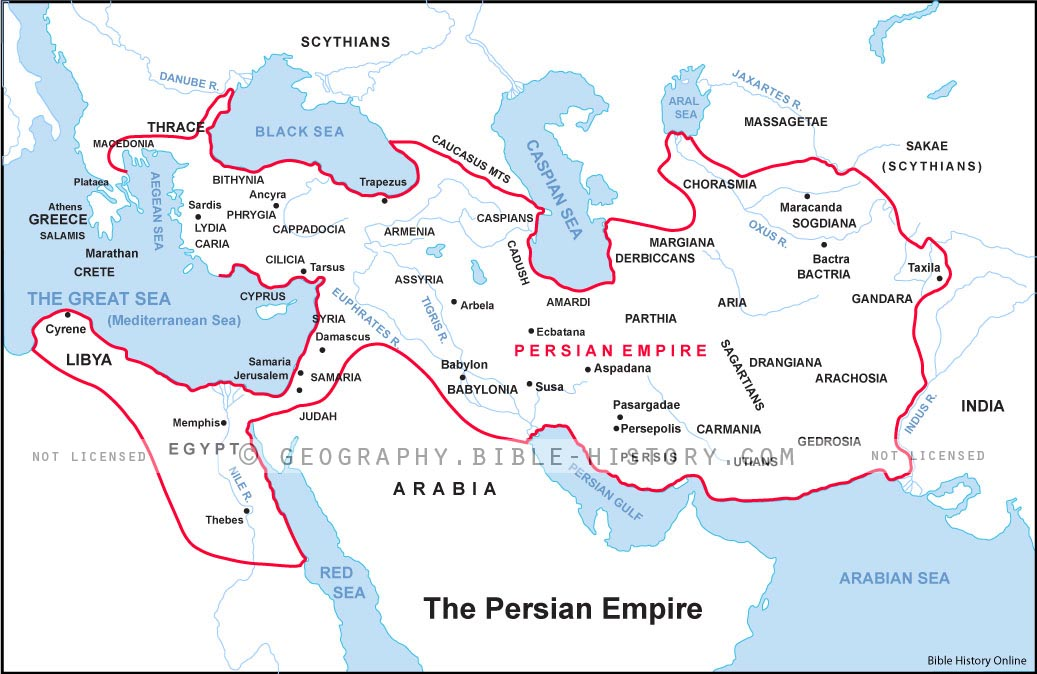Ezr 10:1-17. EZRA REFORMS THE STRANGE MARRIAGES.
1. Now when Ezra had prayed--As this prayer was uttered in public, while there was a general concourse of the people at the time of the eveningsacrifice and as it was accompanied with all the demonstrations of poignant sorrow and anguish, it is not surprising that the spectacle of a man so respected, a priest so holy, a governor so dignified as Ezra, appearing distressed and filled with fear at the sad state of things, should produce a deep sensation; and the report of his passionate grief and expressions in the court of the temple having rapidly spread through the city, a great multitude flocked to the spot.
JFB.
The Book of Ezra
Ezra 1:1-3 - Now in the first year of Cyrus king of Persia, that the word of the LORD by the mouth of Jeremiah might be fulfilled, the LORD stirred up the spirit of Cyrus king of Persia, that he made a proclamation throughout all his kingdom, and [put it] also in writing, saying, Thus saith Cyrus king of Persia, The LORD God of heaven hath given me all the kingdoms of the earth; and he hath charged me to build him an house at Jerusalem, which [is] in Judah. Who [is there] among you of all his people? his God be with him, and let him go up to Jerusalem, which [is] in Judah, and build the house of the LORD God of Israel, (he [is] the God,) which [is] in Jerusalem.
Ezra 9:6-8 - And said, O my God, I am ashamed and blush to lift up my face to thee, my God: for our iniquities are increased over [our] head, and our trespass is grown up unto the heavens. Since the days of our fathers [have] we [been] in a great trespass unto this day; and for our iniquities have we, our kings, [and] our priests, been delivered into the hand of the kings of the lands, to the sword, to captivity, and to a spoil, and to confusion of face, as [it is] this day. And now for a little space grace hath been [shewed] from the LORD our God, to leave us a remnant to escape, and to give us a nail in his holy place, that our God may lighten our eyes, and give us a little reviving in our bondage.
The Old Testament - A Brief Overview
Bible Survey - Ezra
Hebrew Name - Etzra "Ezra"
Greek Name -
Esdras
(Greek form of the Hebrew)
Author - Ezra (According to Tradition)
Date - From 536-456 BC Approximately
Theme of Ezra - The return from the captivity
Types and Shadows - In Ezra Jesus is the one who led the captives out
Tomb of Cyrus the Great at Pasargadae

"O man, whoever you are and
wherever you come from, for I know that you will come--I
am Cyrus, son of Cambyses, who founded the Empire of the
Persians and was king of the East. Do not grudge me this
spot of earth which covers my body." - Cyrus
This tomb of the great
Persian ruler, Cyrus, was discovered in 1951 at the
ruins of Pasargadae (south-central Iran). Over 2500
years old, the tomb is in decent condition, made of
white limestone and stands a total of 36 feet high. The
tomb itself is 18 feet high resting on a 6 level base,
also 18 feet high. It was built like a Ziggurat with
Ionian and Lydian features. There is a small entrance
and double doors leading to a room with no windows which
once contained the "golden sarcophagus" of Cyrus, it is
now an empty shell. Five huge stones make up its roof,
which was slanted (gabled) to shed heavy rains. These
Nordic gables were the architectural style of lands far
to the north. The inscription was seen and recorded by
Plutarch in AD 90.
Summary of The Book of Ezra
The Hebrew traditions treated the books of Ezra and Nehemiah is one book, although they were probably separated in the Bible. The book of Ezra bears the name of an individual who was a descendent of the priest Hilkiah who had helped initiate reforms in the time of Josiah (2 Kings 22:8). Ezra returned from the Babylonian captivity in 457 BC which was 80 years after the first group of Jews had returned to Israel under the leadership of Zerubbabel (13 years before Nehemiah). Ezra was both a priest and a scribe and he had a single purpose, to purify the worship of the Lord among the Hebrews based on the law of Moses. The Jews have regarded Ezra as the second greatest hero in the history of Israel, after Moses.
The most important observation about the book of Ezra is to see how God fulfills his Word, and the prophets spoke continually about the restoration of the people of Israel to the land of their inheritance, after the captivity. God did miracles in the hearts of foreign monarchs like Nebuchadnezzar of Babylon, and Cyrus, Darius, and Xerxes. He fulfilled his purposes through great leaders like Joshua, Zerubbabel, Haggai, Zechariah, Ezra, and Nehemiah to bring about the rebuilding of the wall in Jerusalem, and the Temple of Solomon, and the reestablishment of the law of Moses. The book of Ezra along with Nehemiah provide for us all the history among the Jews between 536 BC and 430 BC. The accomplishments of Ezra focuses on the period from 536 two 456 BC, and Nehemiah begins his mission in 445 BC with a detailed description of 12 years of events.
Quick Reference Map

Map of the Persian Empire at the
Time of Ezra (Click to Enlarge)
The contents of the book of Ezra may be summarized as follows:
Outline of the Book of Ezra
1) The return of the exiles to Jerusalem at the decree of Cyrus, 546 BC (Ezra 1-2
).
2 ) The work of rebuilding the temple begun, brought to a standstill through the
efforts of heathen neighbors, and finally completed at the urging of Haggai and
Zechariah (Ezra 3-6).
3 ) Ezra's return to Jerusalem for the purpose of restoring the temple service
(Ezra 7-8).
4 ) The problem of mixed marriages, which threatened to plunge the Jews into the
same course of idolatry which had brought about their original downfall (Ezra 9-10).
Quick Reference Maps - Ezra
Zerubbabel and Ezra's Journey to Restore Jerusalem - Zerubbabel, of the house of David heeded the decree of Cyrus to allow the Jews to return and restore Jerusalem and later more Jews including Ezra and Nehemiah returned to Jerusalem.
The Persian Empire in the 6th Century BC - The great rulers of the Persian Empire during the 6th century BC were Cyrus the Great, Cambyses, and Darius I the Great.
The Persian Empire in the 5th Century BC - During the 5th centuries BC the Persian Empire expanded under various rulers: Darius I, Xerxes I (Ahasuerus), and Artaxerxes I.
Ezra Resources
More About the Book of
Ezra
Ezra in the Picture
Study Bible
Timeline of the Ancient
World
Back to the Old Testament
Back to Bible
History Online